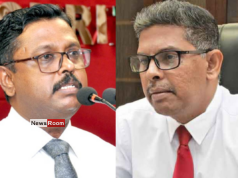Wednesday 14th December, 2022
Popular uprisings invariably upend political systems. The ones that played out here, a few months ago, have led to a strange realignment of political forces. Whoever would have thought, a year or so ago, that the SLPP and the UNP would join forces and share power? More than five million people voted for the UNP, at the 2015 general election, expecting it to trace the country’s stolen wealth, bring it back and ensure that the Rajapaksas and their cronies would be brought to justice for the theft of public funds, corruption, abuse of power, etc. After the Easter Sunday attacks in 2019, 6.8 million people rejected the UNP and elected the SLPP. Today, the two parties have sunk their differences and are savouring power, together!
The SLPP has offered to take its cohabitation with the UNP to the next level—a political marriage. SLPP General Secretary Sagara Kariyawasam has told the media that the SLPP is willing to coalesce with the UNP and will have discussions thereon with the latter. When he speaks, one hears the voice of Basil Rajapaksa, the National Organiser of the SLPP; he would not have revealed the SLPP’s hand unbeknownst to Basil.
Basil, taking part in a television interview on Monday, sought to have the public believe that he was confident that the SLPP was ready for an election, but Kariyawasam’s revelation at issue has betrayed its desperation; the SLPP, which polled about 6.8 million votes (59%) and obtained 145 seats at the last general election, has had to consider coalescing with the UNP, which polled only 249,435 votes (2.15%) and was left without a single elected MP!
The SLPP came into being, in 2016, as an alternative to the SLFP-UNP alliance during the Yahapalana government. Formed by the Rajapaksas and their loyalists in the SLFP, who first banded together as the Joint Opposition (JO), it vehemently opposed the policies of the Yahapalana dispensation, especially the divestiture of state assets.
How would the 6.8 million people who voted the SLPP into power, expecting it to be different from the UNP, undo what the latter had done under the Yahapalana government and do what had been left undone during that regime, will react to the proposed political marriage?
Ideology is the be-all and end-all of a political organisation’s identity as well as strength. Nothing can remain unchanged in politics, and it is only natural that a political party’s ideology undergoes some changes with the passage of time due to socio-economic vicissitudes, etc. But when a party deep-sixes its ideology for the sake of expediency, it loses its raison d’etre, and its appeal to its support base, which shrinks as a result, with only dyed-in-the-wool supporters remaining faithful to it. The SLPP will have its work cut out to avoid this fate, which has already befallen the SLFP, thanks to its cohabitation with the UNP from 2015 to 2018, and other blunders.
The current administration is like an alliance between a blind man and a cripple; politically speaking, the SLPP has some mobility but lacks sight, and the UNP has near zero mobility but is partially sighted. The former is carrying the latter, so to speak, and they seem to have gained from this arrangement. But how long they can go on doing so is the question.
Meanwhile, another strange alliance is said to be taking form. The Nidahas Janatha Sabhawa, an outfit formed by a rebel faction of the SLPP, has joined forces with the SJB, which is a UNP offshoot, to pressure the Election Commission to hold the much-delayed Local Government elections. It is too early to say if they will act as a mere pressure group or their cooperation will lead to a political cohabitation.
Perhaps, the SLPP is making a virtue of necessity by offering to coalesce with the UNP. President Ranil Wickremesinghe has emerged as a strong power centre in the government, and speculation is rife that some SLPP MPs are planning to join the UNP, and their defection is only a matter of time. The SLPP seems to think that it will be able to prevent an erosion of its parliamentary group with the help of a political marriage with the UNP. This is the strategy the SLFP adopted, mutatis mutandis, following its humiliating defeat at the 2018 Local government elections; it entered into an electoral alliance with the SLPP, which was eating into its support base. It worked for the Blues, who secured 14 seats; but, today, about nine of its MPs have switched their allegiance to President Wickremesinghe.
If the proposed marriage between the SLPP and the UNP comes about, that may be the kiss of death for both parties, whose symbiosis has not gone down well with the public.








